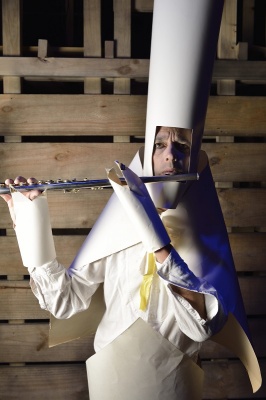THE MAURICIO KAGEL PROJECT
Fletcher Construction Festival Studio at The Arts Centre, Christchurch
10/09/2015 - 11/09/2015
Christchurch Arts Festival 2015
Production Details
The Mauricio Kagel Project is a Free Theatre collaboration with composer Gao Ping and conductor Hamish McKeich. Influenced by John Cage and the Dada cabarets, Kagel created and developed a new music-theatre genre, where music-making itself becomes theatre as a comic, absurd and above all joyously playful activity.
Directed by Peter Falkenberg, a work-in-development will be presented as part of the Christchurch Arts Festival (Sept 10, 11) alongside a reprisal of the Free Theatre’s popular Beat Generation Ubu Night (Sept 12). Public workshops will also be presented as part Free Theatre’s growing Education Programme.
This project is supported by Creative New Zealand and the Asia New Zealand Foundation.
Fletcher Construction Festival Studio at The Arts Centre
Sept 10 & 11, 8.30pm
$15
(UBU Night, Sept 12, 8.30pm, $10 Door Sales Only)
http://www.freetheatre.org.nz
http://www.artsfestival.co.nz/mauricio-kagel-project
Theatre , Musical ,
Commitment, skill and creative high jinks
Review by Lindsay Clark 11th Sep 2015
One of the defining attributes of Free Theatre is its strength in collaborative work and especially in presenting experimental theatre where international practice is explored. In the current project, listed as a work in development, the theatrical composition of avant garde Argentine-German Kagel and similarly ground breaking material from international composer Gao Ping are put together in an evening of exhilarating colour and sound.
Behind the black curtain which separates Ubu’s Bar, official entry point for The Gym, and the performance space itself, intriguing warm up sounds ensure that when we are admitted, there is already an expectant appetite for whatever will be served up. Few could have been prepared though for the bustle and cheerful cacophony of Kagel’s Music Fair, emanating simultaneously from extraordinary booths on each side of the central stage. This is backed by the musicians proper under the assured control of Hamish McKeich, somehow able to keep track of all corners of a very busy happening, not to mention the playful medley of instruments involved.
Playfulness is indeed an essential quality of the business, with cajoling characters garbed like the personae of a very whimsical fairytale, exhorting us to buy their instruments – made up of pretty well anything imaginable. There is a lot of good humour flying about as the audience wanders around, taking it all in before settling, mostly on the stage itself.
What follows is a selection of compositions from Kagel and Gao Ping, featuring their exploration of the role of music in performance. No mere accompaniment or support of enacted narrative or emotion here. Music and musicians are the vital component in this theatrical scene.
For the majority of pieces, the actors from the booths join in. Greta Bond, Mica Doljnikoff, Marian McCurdy, Gijs Ochsendorf and Emma Johnston of the extraordinary singing voice are a fine ensemble, with ironically pitched announcements contributed by George Parker. Their movement is both free and disciplined, often involving what must be carefully choreographed interaction, but which carries the freshness of improvisation.
They feature most significantly in a match between the two composers, to be judged by ‘clapometer’. They become musical instruments themselves in costumes from Sylvia Houston, designed to rattle or tinkle or rustle as they are ‘played’. Sometimes they are excitingly percussive as when the hoof/feet of one actor/faun strike the stage.
The range of musical material is considerable, though all treated with similarly bold originality. Shostakovich is the closest I could come to an equivalent. There’s a Pas de Cinq, based around a pentagram drawn on the floor, two aptly titled Exotica, an elegy, a tango and a Waltz of Irony and Sentimentality.
Traditional applause seems a little lame in this unconventional setting, but the audience delivers it with genuine delight for the commitment, skill and creative high jinks of it all. There is a lingering thought – if ‘music’ made from kitchen utensils or an adapted traffic cone is a marketable commodity and if the relative merits of real musical craft can be decided by our applause, what does that say about us and our society?
Copyright © in the review belongs to the reviewer







Comments